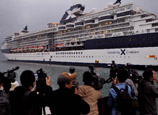
Wen: So this is my, actually this is my next question, for the first time since the U.S. normalized relations with China, both countries have undergone leadership transitions at the same time. What’s your vision on this rather complicated relationship for the new years and new leaders? As for U.S.-China relationship, what’s your advice for the new leaders of two countries?
Brzezinski: My advice is very simple. They have to meet often and talk to each other privately and with friendliness. It’s not good enough to stand in front of the White House or to stand in front of Tian An Men Square and for the two leaders to say we love each other. They have to be able to talk to each other seriously about problems, about the kinds of things that I mentioned to you very directly. Because I feel that as an old friend of China, because I’ve been always very frank and direct with your leaders, I have a right to say that. I think we are moving into a phase in which your nationalism and our nationalism could become mutually adversarial. And that would be unfortunate.
Wen: Well, just now you already mentioned “pivot.” As President Obama entered his second-term, we noticed that Secretary Kerry’s first visit was to Europe and the Middle East. What do you see as President Obama’s China policies in his second-term and do you think his so-called “pivot” in 2011 will have some adjustments in the year of snake?
Brzezinski: Well, first of all let me repeat, “pivot” is a journalistic term. The president never used it. I know that from him, he never used that word. Some American officials used it, but the president didn’t. What was intended was simply a reaffirmation that with Asia becoming more important, and with us being a Pacific power, we have to be more present in Asia. Now Kerry is going to Europe and the Middle East because there are problems in both places. I think you should be flattered that he is not going to you, because that means you’re not on that list. Look where he is going. Everywhere where he is going there are problems. He went to Egypt. You want him to go to China for the same reason that he is going to Egypt? No, because you are doing well, you’re stable. But quite seriously, I think both President Xi and Obama ought to re-read the January 2011 Obama-Hu Jintao Communiqué, which is very ambitious and outlines exactly what is needed. And secondly, they should have regular meetings. And I think that right now there is no plan for Obama to go to China or to meet with Xi. There ought to be informal regular meetings every year, informal but regular, because, look, even the very interconnectivity of these two economies is such that unless we work in a cooperative manner, collisions of a social economic type could be very disruptive for both of us. That I think is the key point. Beyond that we obviously have serious problems to try to contain. I think a war with Iran would be a disaster, for Europe, for Asia, and eventually for the United States. And we have to respond to that challenge jointly. I think the Iranians have to realize that the NPT (nonproliferation treaty) is a binding obligation. We have to realize that Iran as a historic nation, very proud, large, has a right to have a comprehensive nuclear program, but that everyone else has the right to be sure that it is not the point of departure for nuclear weapons. Look what happened in North Korea. They are becoming increasingly, to put it delicately, “unpredictable”. That’s not good for South Korea, it’s not good for Japan, it’s not good for China, and it’s not good for us. There are other problems; I think the more we look at global problems as problems that are of importance to both China and America, that will be the beginning of a sense of shared global responsibility. I think you’re now at a stage at which your future development can no longer be pursued without considering its global effect, for better or for worse. That’s the new reality. We have to get accustomed to the idea that the fifty years of the American domination of the world, militarily, financially, has finished. We are still the number one power and will still be for some decades to come, and then we will see what happens. But in the meantime, we have to work with others—and with you—very much so, but also Japan. American-Japanese ties are not meant against China, but are meant to maintain stability in the west Pacific. And we want to strengthen Europe, because a stronger Europe will have more opportunity to be a constructive player on the world’s scene. We need a stronger Europe on the world’s scene. The fact is Europe is unable to cope with problems that affect Europe, so they come to us all the time for help. We have to have a relationship with the Europeans which will create a greater capacity both to deal with these problems and on that basis to seriously negotiate with the Far East regarding trade arrangements and so forth. I’m sorry that the trans-pacific partnership idea, that we are propagating, doesn’t include China. I think that is a mistake. But I also know there is a Chinese proposal, for an Asian cooperative sphere, which does not include us. We are both making mistakes.
Wen: OK, you know, once you said that the real threat to a stable U.S.-China relationship arises neither from America’s nor from China’s hostile intentions, but from the disturbing possibility that the revitalized Asia may slide into nationalistic fervor which then precipitates conflicts in Asia reminiscent of 20th century Europe over natural resources, or territory , or national power. From what has happened in the region those days, is it still your central point?
Brzezinski: It’s not my central point, but I think there is a serious danger that there could be a repetition in Asia in the 21st century of what happened in Europe in the 20th century: a combination of territorial and ethnic conflicts, of national ambitions, and sometimes of hegemonic aspirations. You know the history of Asia better than I. Almost every relationship in Asia across the border is at least partially hostile. And that could break down. This is why I think that an American presence in the west Pacific can be stabilizing and therefore good for Asia, and particularly good for China, because if any country in Asia is the object of increasing fear on the part of some, it is China. Most people don’t fear Indonesia, they don’t fear the Indians, they don’t fear the Japanese anymore. The Japanese are getting old and they’re in a very different psychological state of mind because of World War II. People fear China. You could find yourself isolated. You’re big enough to survive it, it wouldn’t be terrible for you, but it would not be good either. What I advocate for America is not involvement in mainland conflicts or some sort of anti-Chinese alliance, but a presence a little bit like Great Britain in the 19th century vis-à-vis Europe: no involvement on the mainland but careful balancing so that stability is maintained. And I think that’s helpful to China.
Wen: Well actually, Dr, you just mentioned your hope that president Obama and Xi meet more informal and often, and also, you suggested that US and China should define new targets to develop trans-pacific code of conduct, and reaffirm the significance of the emerging and historically unprecedented global partnership between America and China. What do you think the core of this code of conduct should be?
Brzezinski: Well, I think it’s previewed in the January 2011 joint communiqué. I don’t think it needs great invention. It’s common sense. So I don’t want to use any words which can be viewed as me suggesting what it has to be. I think both President Obama and President Xi have a very good understanding of world affairs, a solid understanding of world affairs. If they decide to make a joint statement regarding a shared code of conduct, they’ll have no difficulties in drafting it themselves in thirty minutes.
Wen: Ok, Dr., my last question is that in recent years, we have witnessed quite a few problems, difficulties and conflicts, in economic fields, mil-to-mil relations, and now a lot talk about cyber war. What do you think are the best ways for two sides to tackle those difficult problems?
Brzezinski: Well, I’m not going to offer a solution because I am not a utopian. It is conceivable that these problems will not be handled well and that they’ll get out of hand. But I think it is certainly possible for us to make a joint effort to prevent that from happening. And we first of all have to start with the intent of getting these problems under control. We are not doing it right now sufficiently. Also there is this negative drift in the atmospherics of the American-Chinese relationship. That has to be overcome, since atmospherics can become the beginning of epidemics of hostility. And that we have to avoid.
Wen: And on the whole, are you optimistic about our two country’s relationship?
Brzezinski: I’m still optimistic but when I see, for example, the Chinese military newspaper suggesting that China should link up with North Korea and Russia against America, I say to myself that if there was an American air force general or admiral saying that publicly, he probably would be fired.
Wen: Ok, thank you Dr.

















 Beijing's 2013 pollution goals set far too low: experts
Beijing's 2013 pollution goals set far too low: experts


![]()
